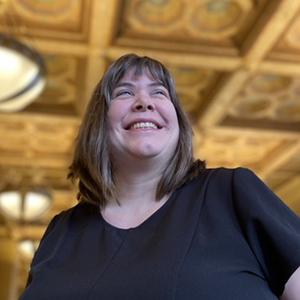by Sara Ring
Quick Summary
I attended DPLAfest for the first time, which took place at Chicago Public Library. Read selected highlights from sessions about digital preservation assessment, creating community history web archives, and controlled digital lending. DPLA has also posted recordings from all the plenary speaker presentations here.

I attended DPLAfest for the first time, which took place at Chicago Public Library. I volunteered and also had the chance to attend some great sessions that I wish to highlight below. Several other Minitex/MDL staff attended as well; Greta Bahnemann presented Mind the Gaps: Evaluating Digital Collections for New Opportunities and Molly Huber took part in a panel presentation Standardized Rights Statements: A Data Driven Roadmap for Rights Statement Sucess, Working Group Updates, and Community Conversation.
Building a Community: Digital Preservation Assessment
Ann Marie Willer, Director of Preservation Services at the Northeast Document Conservation Center (NEDCC) discussed an NEH funded Digital Asessment Training program they led that approaches digital preservation assessment through case-study assessments, shadowing, and workshops. As a result of their work, they are publishing (soon) the Digital Preservation Assessment Handbook. The handout includes an assessment framework, pre-visit questionnaire, glossary, and report template that they refined during the course of the grant period with pilot participants and others. They also published the Digital Preservation Peer Assessment framework, now available on their website.
Unlocking 20th Century Literature: Controlled Digital Lending for In-Copyright Material
Libraries and archives have digitized public domain materials and increased access, but much of the materials published after 1923 are not widely available due to copyright restrictions in the United States. For example, if you look at the Biodiversity Heritage Library digital library, their holdings are rich pre-1923 and then drop off significantly after. Chris Freeland (Internet Archive) described how Internet Archive's controlled digital lending service allows libraries to digitize and lend digital versions of non-circulating physical volumes on shelves.
Kyle K. Courtney (Copyright Advisor, Harvard Library) and David Hansen (Associate University Librarian for Research, Collections & Scholarly Communication, Duke University Libraries) gave a review of how libraries can legally do what we do (e.g. lend materials that are in-copyright). If you would like to read more, there is a nice summary of the first sale doctrine and fair use available in a recent blog post by these two presenters.
To quote one of the slides in the presentation "A library is acting within fair use if it digitizes and lends to users the full text of a copyrighted book, provided it does so within carefully implemented limits and safeguards, and provided that the library's primary purpose for making and using the digitized book is limited to uses that are within the distribution and related rights that all libraries have under the first sale doctrine..." Through controlled digital lending, a library circulates the exact number of copies of a specific title it owns, and has controls in place to prevent copying or redistributing the digitized version. It's a "lend like print" model, and is meant to address the problem of accessing older books still under copyright but unlikely to be offered digitally by a commercial service. To read more about how fair use supports controlled digital lending, visit this webpage.
Open Libraries is an implementation of controlled digital lending at Internet Archive. Books come in to the Internet Archive from the library (and bookseller donations), are scanned in their scanning centers, and made available to readers all over the world via controlled digital lending.
- They have 969,000 volumes in the "Books to Borrow" collection
- Can be borrowed for 14 days
- Can check out 5 books at once
- Use Adobe DRM
Community Webs: Empowering Public Librarians to Create Community History Web Archives
Jefferson Bailey (Director of Web Archiving & Data Services, Internet Archive) kicked off the session with a description of the Community Webs project. It is an IMLS and Internet Archive funded initiative to work with public libraries to build collections of web published materials documenting their local communities. The program provided funding for staff professional development, training, and services. By the end of the grant period, they expect to have 20-30 TB of archived web resources from 27 public libraries.
Two participants spoke about their experiences with web archiving and the program. Melinda Shelton from Birmingham Public Library looked at the project as a digital companion to what they formally held in their print vertical files (where local clippings were held, for example). You can see examples of what they archived here. Makiba Foster from the Schomburg Center for Research in Black Culture (part of New York Public Library) spoke about their participation. As part of their project, they archived the #hashtagSyllabusMovement, a collection of syllabi and reading lists crowd-sourced from all over highlighting race, police violence, and social justice issues in the black community. They archived campaign websites of black women running for office, and then expanded it to include all black politicians running for office. They also archived The Green Book web resources that feature stories about the Green Book travel guides, the creators Victor and Alma Green, and the film.
